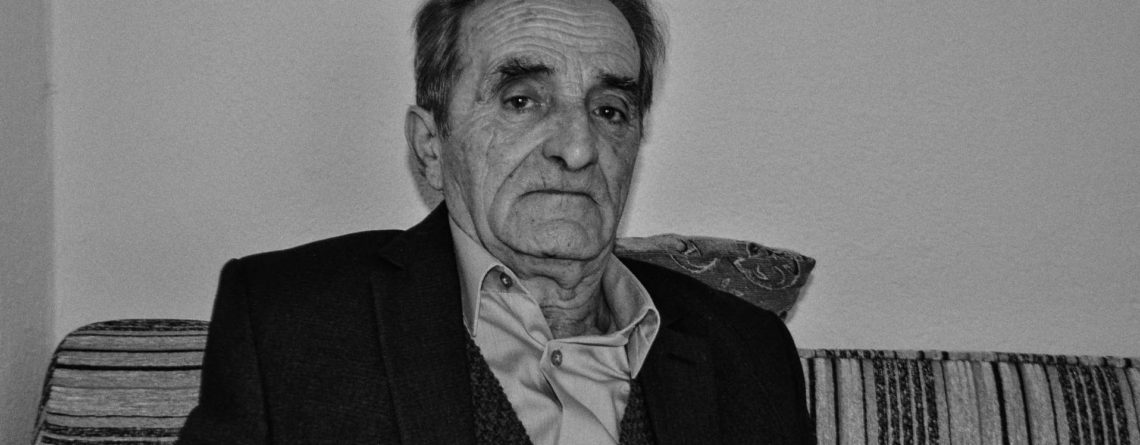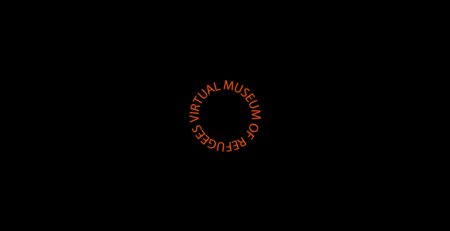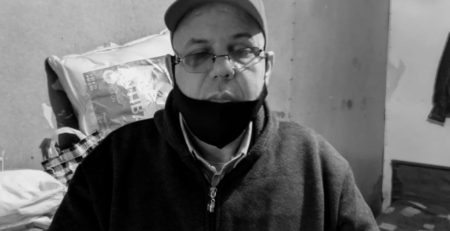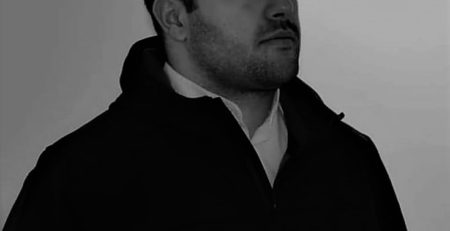Ibrahim Gashi
Bjeshka Guri (interviewer)
Ibrahim Gashi (interviewee)
Acronyms: BG=Bjeshka Guri, IG= Ibrahim Gashi
IG: I am Ibrahim Gashi from Privoca. I am now 69 years old. It was spring and we used to call it “the bloody season”. The spring of ’98 came with the smell of blood. In Kosovo the season came bleeding, as the barbarians brought them. They were severe for us in Kosovo. A season of bullets and gunpowder was the spring of ’99 when the barbarian madness made us leave our predecessor’s land. In the early morning of March 28, 1999, I woke up as in between nightmares. An exhausting night was stuck in the lost minutes. On a narrow, foggy path you could see the long line of people curving through the wavy roads of the village, the cold roads of my village. “We are running out of time”, I said to myself. Where would we line up? In what murderous abyss are we being extinguished, young and old, on the edge of the XX century? Unprepared for the worse that was approaching us, we did not know. Bullets had touched virtually every corner. Death had taken a grip on everything. The funeral shroud had covered the earth…Gloom everywhere. Long lines of displaced people from Istog, XX, Gurakoc, Tomos, Lluga, Llokovc i Begut, Zhevina, passing through Privoda, hiding them within its curvy roads/threading through its roads. There were some Albanian military sites here, and they had occupied the road, as I said in the beginning, the wavy road. I saw them walking along with their horses, carts, some with… [00:03:25]. So they were passing through Privodë to Vrella, Syrenica or Kaliçan, approaching the slope. They were aiming to approach the mountains as a shelter, to climb the mountain in difficult times because the lives of these people were endangered by the chauvinist and barbarian Serbian regime. My eldest brother – I am answering now your second question – had ordered that we split in two, that I immediately take the children to Vrella. Because I was left here, the entire village had escaped, and he wanted me to take the children to Vrella. “I have to stay”, he told me; he refused to leave because he had enrolled his son, Sami, in the KLA. Sami had accompanied the soldiers for three months and had provided shelter for them, in my brother’s house. They used to come, of course, secretly, hiding. My family and I, my wife, my four children, my father and two brothers, spent March 28 and 29 alone in the entire village because Privoda had been abandoned by all. Soldiers were taking guarding from three sites of the rare cruelty of that mouldy and barbarian regime. The Albanian being was rounded with a strait that left only blood, flesh and bones. The forest was engulfed in silence, but also in crow caws. Cowsheds, sheep pens, horses neighing, an entire world of animals in God’s mercy. The fences had been put together to save the animals from any attack of the Serbs. They had let the go because they knew they had to escape, to leave. The two nights I stayed here in Privoda I did not hear anything else but crow caws, dog barks, and horse’s neighing, because there was not even eletricity. It was a very difficult night until I took the decision to take the children to Vrella, where about 50,000 people were taking shelter. In Vrella we stayed at my father’s uncles. …[00:07:18] his house was empty, so my brother told me to shelter my children, my father, and my younger brother there. We were together. We stayed there for about a week although there were bombings day and night, all the time. Sometimes we took shelter in some houses that were built of cement plates. Thus, we had to leave again and go to Liskovika, to climb the mountain a bit further. It is called Liskovikë. There we built tents of nylon. Whoever had taken any clothes or something else, we used to tear them apart and sleep on them. We stayed there for almost a week until we had to escape because of the bombings. So we escaped. We climbed that mountain higher. My father did not want to. “Let them kill me here, I don’t want to go.” I remember that I let my children and my wife make that journey with my father’s uncle. I returned to take my dad because he insisted he would not move from there. I somehow managed to convince him. We climbed the mountain, and joined the crowd, although they were shooting at us…
BG: They opened fire against you even when you were walking?
IG: Yes, they did. They opened fire in the places where we had built our nylon tents. They arrived there. So we were escaping up the mountain. I remember that we survived. During that journey no one died, but there were old people and persons who needed help, small children and such, in order to go another mountain, which is called Paja.
BG: You took these notes during that journey.
Ib – During the journey. When we arrived at a mountain we stopped to rest. We escaped the bullets. A cold wind was blowing, haild was falling. There was also snow because it was the time when the snow started to melt, in March. I know that during that road they said that a child had died, two children actually. Probably from the cold or negligence. It was very difficult. I don’t know…After climbing that mountain, we went to – I don’t know what it is called, I have forgotten. No, we left Leskovik. On top of the so-called Bjeshkë e Nemuna (the Cursed Mountains). We sat to rest for a while since we were safer now. There we met Ramiz Emigranti. He was an emigrant from Albania. His son had been killed when some men here in Lubozhda had been fighting with the police and had killed 2 police officers. He was looking for his son everywhere, so we met him there. He said he had been wandering around those mountains for a week. We had some bread which the women had baked while we were in Leksovik since we knew we were going to escape again. I said to my wife “Give me some bread and let’s give it to him because he said he has not eaten for a week”. He said “I cannot swallow it” because his mouth was bleeding. And he did not find his son. To this day they still do not know where he is.
BG: What did you hope to do with these notes that you took during the road in the mountains?
IG: Well, I always knew and said it even then. I was a member of the Democratic League of Kosovo. I was in the presidency of the sub-branch. I know they used to say we will have a meeting but it was dangerous. I told them we would fare better with Rugova than Miloševič. Him awaits the worst, us the victory. And so it happened.
IG: It is called Qafa e Belegut. That is where two children died. We saw wild animals that had died because of the cold and the wind. And two children also died there. I do not know whose children they were, I just know that I know that the majority of people in the queue were from that side. On 26th of March, in our century, Kosovo was covered in ashes. This is demonstrated by the massive graves, the burns. As if the final days of the XX century were being brought by the barbarians in ’98-’99. Something inside us did not leave us alone. We had left our houses and now that we arrived in Leskovik we could see our houses being burned, and from that height we knew the places.
BG: Where did you go after that?
IG: From that mountain we went to Rožaje. They treated us very well. Both the Bosnians and the Montenegrin, they were not bad to us. Bosnians especially. The provided shelter to us and helped us. But we were placed in a factory. We stayed there for two nights and – I don’t know what was inside, it was like to shelter refugees. We stayed there with the children and my father. There were a lot of people. I know it was concrete. The first night we spent there they gave us…we did not sleep but the children had to sleep. I remember that we laid our legs and put the children on our lap. Because they wanted to sleep. Then, after two days, I met someone from Istog, Ram Alihajdaraj. I think he knew me. He was a teacher in the secondary school. He had come there earlier and had been placed in a hotel. And I met him one day. I asked him where he was staying. And he said that he was staying at a hotel which the internationals had paid for. I told him “I have four little children and my father. We’re very bad.” Then he sheltered us there but we only stayed there for two nights. We then had to go to Albania. We set off for Albania. We crossed the border. There were problems during the road. I don’t know how many people the Serbian police killed when they were travelling from Rožaje to Albania…I don’t know that. But I do know that people had been murdered.
BG: On the road from Rožaje to Albania?
IG: Yes, on that road.
BG: The Serbian police?
BG: The Serbian police. When we arrived, we were wet from the rain and the snow, we were tired. We had to wait for too long. So we waited there; some Albanians used to say that we had to wait until the van comes and then they would take us. Late. We stayed there about three hours, near Shkodra’s lake. Then they came and took us to the tobacco factory. We were wet, and we used the pallets where the tobacco was hanged, all covered in dust; we laid them on the ground and slept on tem. It was like sleeping on dust…it was very difficult…I pulled everything we had inside that factory and I do not know how it happened but I had a heart attack. A friend of mine took me to the doctors in Shkodra. I spent the night there. A radio television journalist there – I think it was form Prizren – comes to visit the refugees in the tobacco factory. He sees my wife and children crying because I was sick and asks them “Why are you crying”. They tell him. He says, “When Ibrahim comes here, tell him to contact me at the Austrian Camp. So I went to the Austrian Camp. I remember I did an interview for Radio Tirana by chance. My main problem was that… We were grateful to our motherland for sheltering us there but there were soldiers of the camp protecting us. The German camp was also nearby. Armed Albanians used to shoot the German camp that was close to us.
BG: Albanians?
IG: Yes, yes, Albanians from Albania. They had riffles, they had… they were like savage and it was so bad. That is what hurt me the most. Why did Austrian soldiers had to protect us when we were in our homeland?
BG: So they attacked Kosovo Albanians too?
IG: Maybe they wanted to rob something, I don’t know. But it hurt me the most that we did not find comfort there. Despite the fact the Austrian camp took very good care of us, there was the health centre there, they had all the tools. They even dug for water because it was very dry. They provided us water too. But when our girls, females would go for water somewhere near the fence, those from Albania would approach them and…they behaved badly. Very badly. And that hurt, you know. I remember saying in the interview, “We left Kosovo in fire and ashes, we came to our motherland and now the Austrian camp soldiers have to protect us.”
BG: Did you listen to any news on Kosovo during your stay in Albania?
IG: Well, we did, we did. We used to go at some houses, watch TV. But even those places were scarce. I know they behaved extrememly badly, I repeat, although I was grateful to them. I used to be an employer of the secondary school in Kosovo after we left “Rilindja” and the Secretary told us to find another job, “continue to work wherever you can find one.” I was a professor of Albanian language and literature. A pedagogue of the school, called Ramiz Zeqiri, and I organized lessons for our Albanian children, so that they could learn something and not waste their time. The Austrians provided us with a large tent, desks and chairs. I was appointed a teacher. Do you remember what that place was called. Shkodra. No, it was a school. Gruda. I also knew a man called Binak Gërguri. He was also appointed a teacher there. This was also a very tough experience. We had to bring, in particular, Albanian girls to the camp. Our life was in danger there too a few times. I remember saying to Binak once, “I am not leaving these girls alone here” because they used to come saying “here’s the van, come on in”, because I knew where those idiots wanted to take them to. I told him, “Binak, I would rather die than leave these girls.” Horrible. He said, “I am with you too.” And this hurt me a lot, it tortured me a lot, you know, that our girls were not free in their motherland.
BG: So you held parallel lessons in the camp with the other refugees?
IG: First in camp but then only the pupil from grade 1-8 remained there. The secondary school was sent to Gruda. The students could travel. It was not too far. They could travel and go to Gruda. We held lessons there for a while. But, for this to happen in the Albanian soil…I could never go there before because I was politically convicted, I did not have…I also lost my passport…and I could never go there. I remember as a senior student we had planned to go there. Fehmi Agani, who was the dean of the faculty, said that we could not go. And so we did not go. Although I had the chance of somehow sneaking in within the students. So the first time I walked in the motherland I fell on my knees and kissed that land. I was very disappointed by them although people in Shkodra had a tradition, not institutional but a preserved tradition. There were very good people, there were people who cried with me after I told them about my troubles and pains. But there were also all kinds of people. There were…there were of those who when someone crossed the border condemned Slobodan Miloševič for not killing us, for not murdering us. I don’t know what party they belong to or what kind of men they could be but this hurt me a lot. It tortured me a lot, more than the escape, more than the war, more than everything else. A man of my village, Naim Dreshaj, was murdered at the border with Albania while bringing weapons here. Another woman of the village was lost, no one knows anything about her. Same as my brother’s son, Sami. The case of my uncle in Xërxë, as I told you, two were burned, one murdered, one maimed, whom they found in the mountain. In short, I met in Beleg the sons of the two persons who were burned. One of them is now chairman of the Municipal Assembly of Istog. He said, “We took the other members and children to Rožaje and came back with my brother to take our parents.” But when they came back they found the houses and everyone burnt. The same happened to the other uncle, Kadri. They found him maimed in the mountain. In Vrella too they killed people. A man called Muharrem […00:30:53] stayed wounded for days. I have heard people saying that he could barely find a chicken and eat its raw meat because there was nothing else to eat. This is what I have head because he had left a letter in a whole on the yard’s wall. And they found it. He was a soldier. But when the army’s sites were destroyed everyone did what they could for their own selves. There three sites here: one in Lluga, one in Prigovc, one in Januzaj, on the border with Lubozhda. When these three sites were destroyed that was it, and the soldier had to…escape.
BG: Can you stop and reflect on the effect of the war on your every-day life ?
IG: I believe that these trauma have left their traces to this day. People experienced everything. When we returned I heard about the case of Syrenica, a village where two students were killed. One of them was, I think, in the first year of secondary school. They are the Lipaj family, from Syrenica, and found them in the well. Another old man of Syrenica was found in the well. As well as an old women. The members of these families experienced something very difficult. There was a women from that family working in the library at school. And I asked her, “Do you know anything about those girls?” She immediately started crying. She worked in the school’s library, now she is a professor in the gymnasium. She said, “Ibrahim, their shoes stayed in the meadow the entire summer. No one could go and take them.” The entire summer. Although they had come back. No one could go take them.




